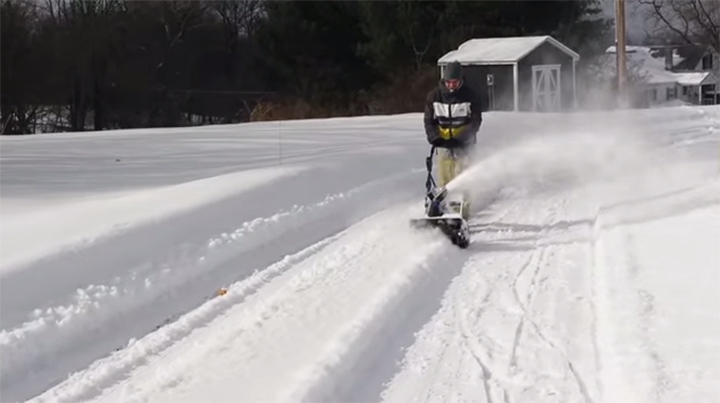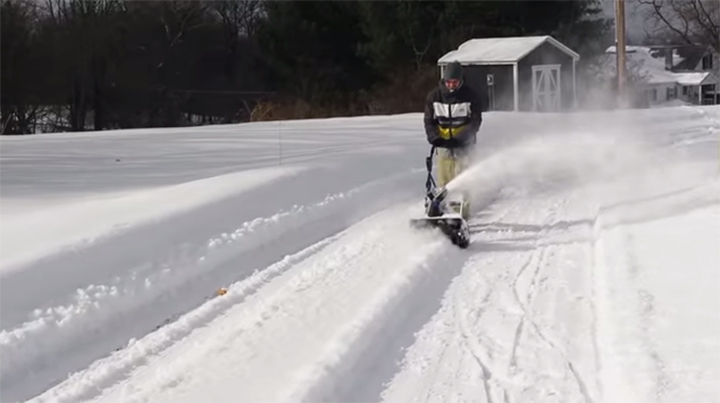Welcome to our friendly blog post where we will be discussing whether or not a snowblower can be left outside in winter. Winter is a time when we rely heavily on our snowblowers to keep our driveways and walkways clear of snow. However, many of us may wonder if it is safe or practical to leave our snowblowers outside during this cold season. In this article, we will explore the potential risks and benefits of leaving your snowblower outside in winter, helping you make an informed decision.
Leaving a snowblower outside during winter can have both advantages and disadvantages. On the positive side, it saves space in your garage or shed and eliminates the need to constantly move it in and out. Additionally, leaving it outside can be more convenient, as it allows for immediate use without any setup. However, there are also drawbacks to consider. Extreme winter temperatures can cause damage to the engine, and exposure to moisture can lead to rust and corrosion. Furthermore, leaving your snowblower outside increases the risk of theft or vandalism. We will explore these factors further to help you determine whether it is worth the risk to leave your snowblower outside this winter.
Can a Snowblower Be Left Outside in Winter?
Understanding the Impact of Winter Weather on Snowblowers
Winter weather can be harsh and unforgiving, especially for outdoor equipment such as snowblowers. Snow, ice, freezing temperatures, and moisture can all have a detrimental effect on the performance and durability of snowblowers. As a result, it is important to consider the potential consequences of leaving a snowblower outside during the winter months.
The Effects of Snow and Ice on Snowblowers
Snow and ice can have a significant impact on the functionality of a snowblower. When left outside, snow can accumulate on the machine, leading to clogged chutes, augers, and impellers. This can hinder the effectiveness of the snowblower and make it challenging to remove snow efficiently. Additionally, the weight of accumulated snow and ice can put strain on the snowblower, potentially causing damage or affecting its overall performance.
Potential Damage to Snowblowers When Left Outside
Leaving a snowblower outside during the winter exposes it to various elements that can cause damage over time. Freezing temperatures can lead to the contraction and expansion of materials, potentially causing cracks or structural weakness in the snowblower. Moisture from snow and ice can also lead to corrosion, rust, and electrical issues. These damages can not only impact the functionality of the snowblower but can also shorten its lifespan.
Considerations for Storing Snowblowers Outdoors
If storage space is limited or unavailable, storing a snowblower outdoors may be the only option for some homeowners. However, it is essential to consider certain factors to minimize the potential damage to the snowblower.
Firstly, make sure to position the snowblower in a covered area, such as a shed or garage, to protect it from direct exposure to harsh weather conditions. If a covered space is not available, use a weatherproof cover to shield the snowblower from snow, ice, and moisture.
Secondly, elevate the snowblower off the ground to prevent the base from sitting in any accumulated water or moisture. This can help reduce the risk of corrosion and rust.
Lastly, regularly inspect the snowblower and clear any snow or ice buildup after each use. This will not only ensure its proper functionality but also prevent any potential damage caused by the weight and freezing of accumulated snow and ice.
Protective Measures for Outdoor Snowblower Storage
When storing a snowblower outdoors, there are several protective measures that can be taken to safeguard its condition. Firstly, consider applying a rust inhibitor or lubricant to the metal components of the snowblower. This can help prevent corrosion and rust, which commonly occur due to the exposure to moisture.
Additionally, it is recommended to remove the spark plug wire to avoid any accidental start-up while the snowblower is being stored. This will also prevent any potential electrical issues caused by moisture or freezing temperatures.
Lastly, consider investing in a lock or security device to deter theft or unauthorized use of the snowblower. This can provide peace of mind knowing that your valuable equipment is protected.
Benefits of Keeping Snowblowers Indoors during Winter
Although storing a snowblower outdoors may be the only option for some homeowners, there are significant benefits to keeping it indoors during the winter months. By storing the snowblower in a dry and temperature-controlled environment, you can mitigate the risk of damage caused by freezing temperatures and moisture.
Indoor storage also provides convenience and easy accessibility. By keeping the snowblower indoors, you eliminate the need to clear snow or ice from the machine before each use. This allows for quick and hassle-free operation during winter snowstorms.
Preparing Snowblowers for Outdoor Winter Storage
If storing a snowblower outdoors is unavoidable, it is crucial to properly prepare it for winter storage. One important step is to drain the fuel from the snowblower’s tank and carburetor. This is essential to prevent fuel from deteriorating and causing damage to the engine or carburetor components. Properly disposing of the fuel in accordance with local regulations is important for both safety and environmental reasons.
Next, give the snowblower a thorough cleaning to remove any dirt, debris, or salt that may have accumulated during use. This will help prevent corrosion and rust during the storage period.
Lastly, remove the battery (if applicable) and store it in a cool and dry location. Extreme cold temperatures can cause damage to the battery, so it is important to keep it in a safe environment.
Proper Maintenance to Ensure Snowblower Durability
Whether storing a snowblower indoors or outdoors during the winter, proper maintenance is essential for ensuring its durability and performance. Regularly inspect the snowblower for any signs of wear, damage, or loose parts. Tighten any loose screws or bolts and replace any worn-out or damaged components.
Perform routine maintenance tasks such as changing the oil, checking the spark plug, and cleaning or replacing the air filter as recommended by the manufacturer. These maintenance tasks will not only extend the lifespan of the snowblower but also ensure its optimal performance.
Tips for Successful Winter Snowblower Storage
To summarize, here are some essential tips and considerations for successful winter snowblower storage:
- If possible, store the snowblower indoors to protect it from harsh weather conditions.
- If outdoor storage is the only option, position the snowblower in a covered area and elevate it off the ground.
- Regularly inspect and clear any snow or ice buildup to prevent damage.
- Apply rust inhibitors or lubricants to protect metal components from corrosion.
- Remove the spark plug wire and drain the fuel before storing the snowblower.
- Clean the snowblower thoroughly to remove dirt, debris, and salt.
- Properly dispose of the fuel and store the battery (if applicable) in a safe location.
- Perform routine maintenance tasks as recommended by the manufacturer.
By following these tips and considerations, you can ensure that your snowblower remains in optimal condition and functions effectively when needed during winter snowstorms.
Conclusion
In conclusion, while it is possible to leave a snowblower outside in winter, it is not ideal due to the potential damage caused by snow, ice, freezing temperatures, and moisture. Storing the snowblower indoors provides protection from these elements and offers convenience and easy accessibility. However, if outdoor storage is the only option, taking proper precautions and following the recommended protective measures can help minimize the potential damage to the snowblower. Regardless of storage location, regular maintenance is crucial for ensuring the durability and performance of the snowblower. Properly preparing the snowblower for winter storage and following manufacturer recommendations will ensure its optimal functionality and extend its lifespan.

This image is property of globalnews.ca.
